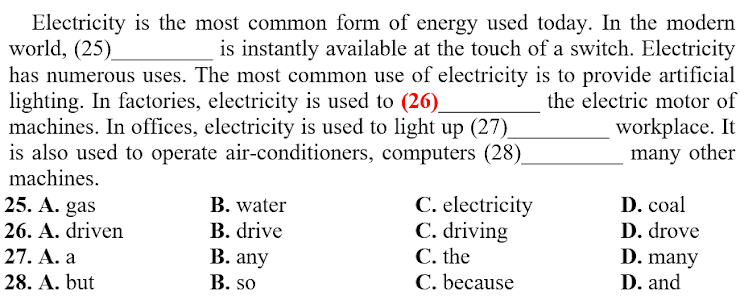I. READING Read the following passage and mark the letter A, B, C, or D on your answer sheet to indicate the correct word or phrase that best fits each of the numbered blanks The country and the city have advantages and disadvantages. People in the country live in more beautiful surroundings. They enjoy (19) …………….. and quietness, and can do their work at their own pace because no one is in a (20) …………………... They live in larger, more comfortable houses, and their neighbors are more friendly,...
Đọc tiếp
I. READING Read the following passage and mark the letter A, B, C, or D on your answer sheet to indicate the correct word or phrase that best fits each of the numbered blanks
The country and the city have advantages and disadvantages. People in the country live in more beautiful surroundings. They enjoy (19) …………….. and quietness, and can do their work at their own pace because no one is in a (20) …………………... They live in larger, more comfortable houses, and their neighbors are more friendly, and ready to help them (21) ……………….. they need it. Their life, however, can be boring and they may be isolated, which is serious problem (22) ……………… they are ill or want to take children to school. The city has all the services that the country lacks, but it also has a lot of disadvantages. Cities are often polluted. They not only have polluted air but also have noisy streets. Everyone is always in hurry and this means that people have no time to get to know each other and make friends.
Question 19. A. quietly B. peaceful C. peace D. quiet
Question 20. A. hurried B. hurrying C. hurriedly D. hurry
Question 21. A. what B. when C. which D. that
Question 22. A. unless B. although C. because D. if
Read the following passage and mark the letter A, B, C, or D on your answer sheet to indicate the correct answer to each of the questions
The country is more beautiful than a town and more pleasant to live in. Many people think so, and go to the country for the summer holidays though they cannot live there all the year round. Some have a cottage built in a village so that they can go there whenever they can find the time. English villages are not all alike, but in some ways they are not very different from one another. Almost every village has a church, the round or square tower of which can be seen from many miles around. Surrounding the church is the church yard, where people are buried. The village green is a wide stretch of grass, and houses or cottages are built round it. Country life is now fairly comfortable and many villages have running water brought through pipes into each house. Most villages are so close to some small towns that people can go there to buy what they can’t find in the village shops.
Question 23. When do city people often go to the country?
A. At the weekends.
B. All the year round.
C. At Christmas.
D. . The summer holidays.
Question 24. What is the advantage of city people when they have a cottage built in the
village?
A. They can have their houses rented.
B. They can go to the country at weekends.
C. They can go to the country when they are busy.
D. They can go to the country whenever they can find the time.
Question 25. What is NOT mentioned in the life of English villages?
A. The village green
B. Running water
C. The church
D. The Internet
Question 26. What can villagers do when their villages are close to small towns?
A. They can go there to buy cheaper things.
B. They can go there to buy whatever they want.
C. They can go there to buy luxury goods.
D. They can go there to buy what is not found in the village shops.


Kiến thức: Câu chẻ
Giải thích:
Câu chẻ nhấn mạnh tân ngữ: It + is/was + O + that + S + V …
It is usually the secondary events (28) that they trigger, such as building collapse, fires, tsunamis (seismic sea waves) and volcanoes, that are actually the human disaster.
Tạm dịch: Thường là những sự kiện thứ cấp mà chúng gây ra, như làm sụp đổ tòa nhà, hỏa hoạn, sóng thần (sóng địa chấn) và núi lửa, những thứ thực sự là thảm họa của con người.
Chọn C
Dịch bài đọc:
Một trận động đất là kết quả của sự giải phóng năng lượng đột ngột trong lớp vỏ Trái đất tạo ra sóng địa chấn. Ở bề mặt Trái đất, động đất được ghi nhận với sự rung động, rung chuyển và đôi khi là sự dịch chuyển của mặt đất. Sự rung động có thể khác nhau về cường độ. Chúng được gây ra chủ yếu là do sự trượt trong các đứt gãy địa chất, mà còn do các sự kiện khác như hoạt động của núi lửa, lở đất, các vụ nổ mìn và vụ thử hạt nhân. Điểm ngầm của nguồn gốc của trận động đất được gọi là trọng tâm. Điểm trực tiếp phía trên trọng tâm trên bề mặt trái đất được gọi là tâm chấn. Bản thân động đất hiếm khi làm chết người hoặc động vật hoang dã. Thường là những sự kiện thứ cấp mà chúng gây ra, như làm sụp đổ tòa nhà, hỏa hoạn, sóng thần (sóng địa chấn) và núi lửa, những thứ thực sự là thảm họa của con người. Nhiều trong số này có thể tránh được bằng cách xây dựng tốt hơn, hệ thống an toàn, cảnh báo sớm và lập kế hoạch sơ tán.